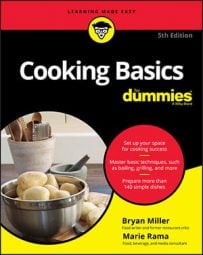Cooking, like medieval poetry, is suffused with myths, muddled logic, and inaccuracies. And they’re passed down from generation to generation — and sometimes cookbook to cookbook — and taken for granted.
The following list explores ten common cooking myths and gives you the real story behind them.
Marinating meat tenderizes it.
Marinades, even the most acidic, penetrate meat a tiny fraction of an inch below the surface. They can, however, impart flavor to the outside. You can tenderize tough cuts of beef, like chuck, brisket, shoulder, and shank, in several ways.
For example, you can simply use a meat tenderizer, which is the size of a large hammer and looks like a medieval torture device. The working end is box shaped and studded with metal spikes. To use it, you hammer the meat evenly to break down the fibers. Another, but less efficient method is to take a sharp knife and score the meat crosswise over the muscles.
Searing meat traps in the juices.
Searing meat in a very hot pan can give meat a nice crusty texture and, if seasoned beforehand, a patina of flavor. But the fact is, meat loses moisture under any type of dry heat. The best way to retain moisture is slow cooking, as in braising, in which the meat rests in a few inches of liquid.
Another way is to sear the meat and roast it at a very low temperature (around 275 degrees) for several hours or until just pink in the center (about 135 degrees). Let it rest for about 20 minutes to allow the juices to settle.
Basting chicken creates crispy skin.
On the contrary, repeatedly dousing a roasting chicken with broth or liquid pan drippings can inhibit the skin from becoming crisp. In effect, you’re creating skin-deflating steam.
To achieve a parchment-like skin, first make sure the bird is thoroughly dry. Begin roasting in a 450-degree oven for 15 minutes, and then reduce to 350 degrees. You can baste the chicken periodically with thick fatty pan drippings (they shouldn’t be watery).
Adding oil to pasta water keeps it from sticking together.
Adding oil to your pasta water wastes your time and money. Instead, add sauce to your pasta immediately to prevent it from sticking together. Or if you leave it out to cool or prefer no sauce, toss it with a little olive oil or vegetable oil.
Using quality olive oil is important for sautéing or pan-roasting.
Chef Mario Batali says that when you use quality olive oil for sautéing or pan-roasting, “you are just wasting good oil. If you have a very good extra-virgin olive oil, use that to drizzle over finished dishes.”
Superior olive oil (read: expensive) is meant for tasting, not cooking. Using a fine olive oil for sautéing meat or fish is like putting premium gas in a lawn mower — the difference won’t be evident because the flavor will be lost in the sizzling pan. Run-of-the-mill supermarket olive oil or vegetable oil works fine. After all, its primary purpose is to prevent food from sticking in the pan.
Using a garlic press extracts more flavor.
Using a garlic press breaks cloves into random bits and squeezes out oil in an uneven fashion, increasing the chances of burning in a hot pan. Evenly slicing garlic allows the oils to seep out uniformly.
Soaking dried beans before cooking improves flavor and texture.
There are several schools of thought on this matter, but most chefs maintained that soaking beans for several hours in hot water, or overnight in cold water, is unnecessary. All it does is speed up the cooking and sometimes makes them mushy.
Adding a potato to an oversalted soup or stew reduces the saltiness.
Chunks of potato added to an oversalted liquid merely leaves you with oversalted liquid with chunks of potatoes in it. The best way to bring down the salt level in a soup or stew is to add an unsalted liquid, like water. Some cooks add a little bit of sugar to cancel out some of the salt.
Cooking with wine or spirits burns off all the alcohol.
Not all the alcohol in pan sauces or stews cooks off. If you simmer something for hours, most of the alcohol does go away. But if you cook for 20 minutes or less, up to 50 percent can remain. (If you flambé, a small amount of alcohol evaporates.) And even less alcohol escapes during baking, because the booze is mired in the thick batter.
Rinsing raw mushrooms causes them to absorb more water.
It’s true that mushrooms contain a good amount of water, which means they give off a lot of liquid when sautéed, making them sometimes difficult to sauté and brown. But they won’t absorb more water if you wash them.
In fact, you should rinse or brush raw mushrooms with a vegetable brush to remove any surface dirt. If you do rinse them, drain them well in a colander or dab off any excess moisture before sautéing.

